
If the private sector is not encouraged to invest, Nepal’s overall economy will suffer
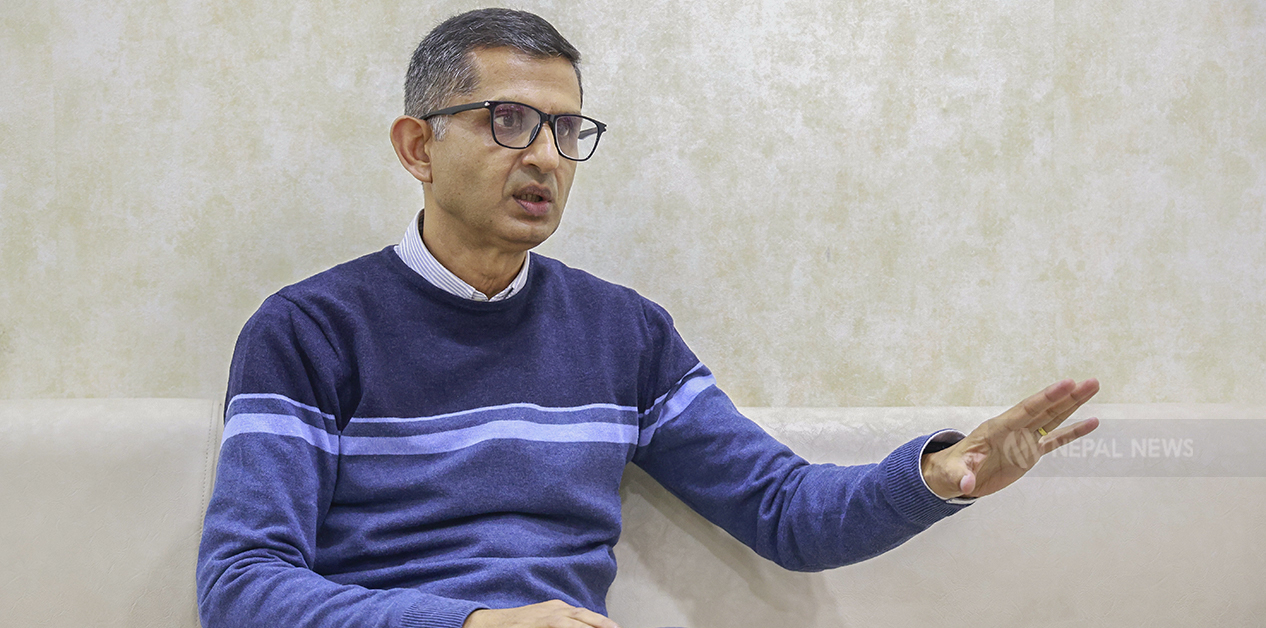
KATHMANDU: Puspa Sharma, a specialist in economics, public policy, and trade-related policy, is a Visiting Senior Research Fellow at the Institute of South Asian Studies, National University of Singapore. He holds a Ph.D. in Public Policy Analysis from the Australian National University.
Below is an edited excerpt of a conversation with Uddab Thapa of Nepal News regarding the country’s economy after the Gen Z movement, the basis for economic prosperity, and public administration.
The Nepali economy has been sluggish for a long time, and the Gen Z movement has further impacted it. How deep is the damage to the economy?
The external sector of the economy was doing well, but the internal economy was sluggish. The exact data on the damage caused by the Gen-Z movement has not yet been released. The damage to the private sector is said to be around Rs 100 billion. The complete details of the damage to the government side have not arrived. Even if the total damage comes out to be around Rs 300 billion, the monetary damage during the movement is not that large compared to the size of Nepal’s economy.
The country’s economy is over 6.1 trillion. Of course, if the damage had not occurred now, the money required for reconstruction could have been spent in other sectors. When national symbols like the President’s Office, Singha Durbar, Parliament Building, and Supreme Court were attacked, there was a heart-wrenching situation for a few days. The damage has occurred, but there is no need to panic. The morale of the security forces has declined after the movement. There is uncertainty about whether elections will be held. The challenge is to move the economy forward amidst this instability.
The impact on the economy should be assessed sector-wise. Agriculture has not been affected by the movement. There is no major damage to manufacturing industries. In any case, the share of manufacturing industries in Nepal’s economy is low.
The service sector suffered significant damage from the movement. Specifically, tourism and retail trade incurred losses. Despite fears of major damage to the tourism sector, the notable number of tourists who arrived in Nepal in October offers hope.
The morale of the private sector, the main pillar of the economy, has been dampened, leading to widespread concern that the economy might become sluggish. What needs to be done to move the economy forward?
If the private sector is not encouraged to boost its morale and invest more, it will affect Nepal’s overall economic sector. The private sector creates most of the employment. The employment provided by the government is extremely low. After the movement, the private sector is worried and fearful about security.
There is also the fear of whether this movement has ended here or will escalate in various forms. What happened now is a major ‘departure’. The important question is how the government can assure them that there will be no more destruction like before and that they will provide adequate security.
On the other hand, the situation where electricity was suddenly cut off to industries and they were forced to close, precisely when the private sector’s morale was low, should never have happened. The outstanding electricity bill to be paid or collected is a matter of contract between the two parties, isn’t it? When making a contract, the two parties must have also mentioned a way to resolve disputes.
The disputes would be resolved through judicial process. I see the government going in the opposite direction by cutting off electricity and shutting down industries at this time. The mindset of everyone in the government is certainly not the same, but there is definitely a lack of coordination there. If the Prime Minister takes the initiative and brings the private sector out of the current situation, morale will surely increase.
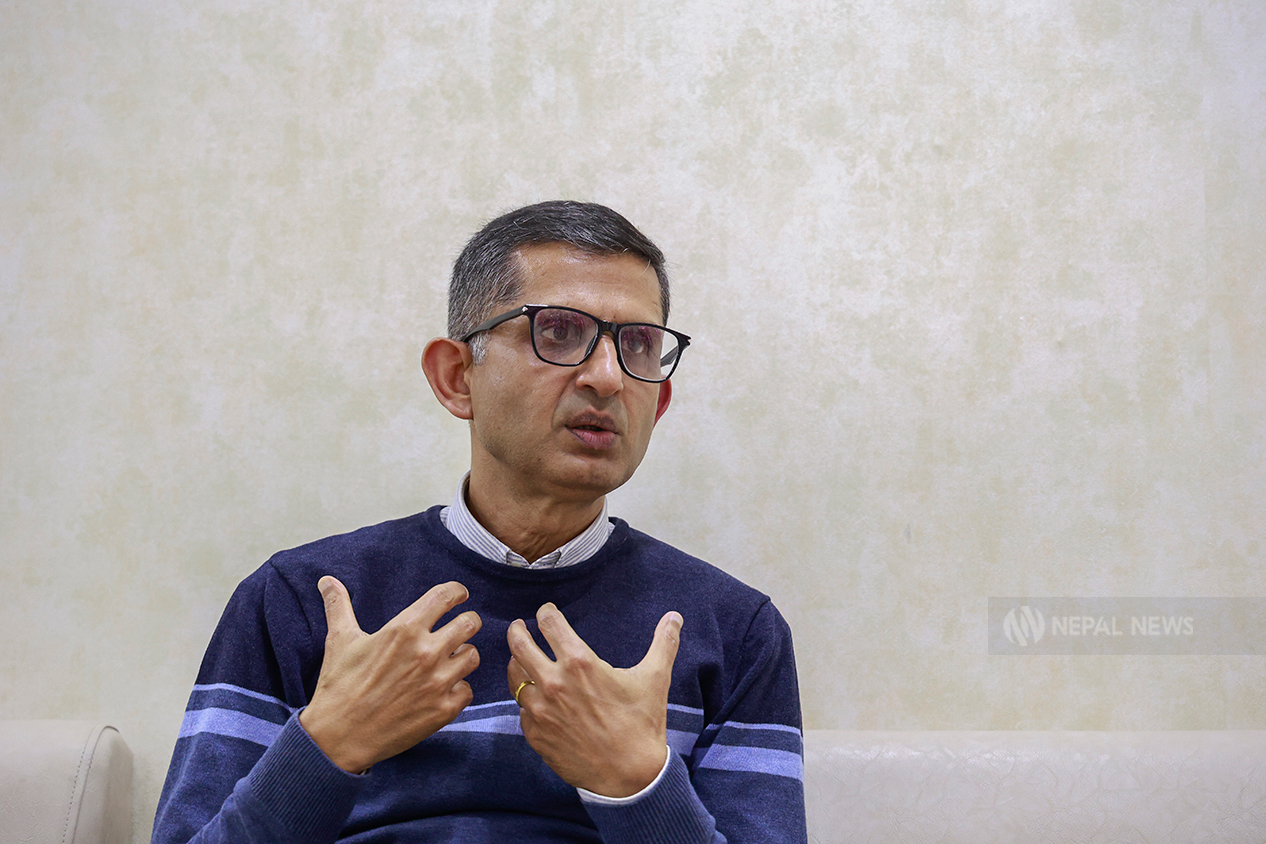
The network of corruption and illegal transactions extended from the private sector to the political leadership. What is the possibility now that these issues will improve and the private sector will focus purely on business prosperity?
The Gen Z movement happened primarily in protest against bad governance. The demand for good governance was key, but what happened later is known to everyone. The current government was also formed with the agenda of establishing good governance. However, this government’s main responsibility is to conduct elections. How much work it can do by the time the elections are held is a separate matter.
If they can address where the weaknesses were, what factors fostered corruption, and then break that cycle to establish good governance by taking two or four steps, a path can certainly be shown.
Another thing is that the possibility of new political parties emerging after the election is not very high. Therefore, the extent to which the old parties reform themselves will be important. Many people associate corruption or bad governance with the old parties. It is not that everything old is bad. But the internal reform of the old parties can give an indication of what the future will be like. There is plenty of room for hope.
In the matter of corruption, the government cannot be solely blamed and escape responsibility. Nor should the entire private sector be accused by putting everyone in the same basket. There are various groups there as well. Some conduct business honestly. Some are dedicated to finding out who to please to get their work done.
The group that is ready to do anything for their own benefit has also been seen. It is not a one-sided process where only the political leadership seeks someone for personal gain. It is a reciprocal process. There is hope that this might improve after the movement.
Whenever a government is formed, it claims to work after winning the trust of the private sector, and the private sector also complains that the government does not understand its importance. Why does this happen?
This happens precisely because of a lack of mutual trust. There is policy instability in Nepal. There is no certainty about how long a government will last. The policies made by one government are not carried forward by the next. The private sector makes long-term plans and large investments based on a certain policy. When there is policy instability, the private sector cannot make long-term plans.
Furthermore, the implementation of existing policies and laws is weak. It has been years since the single-window policy was declared, but it has not been implemented. To register a business, one has to wander through various agencies. There is no effective coordination between these agencies.
A system where the mechanism actually works has not been developed. On the other hand, the exploitative mindset of the political leadership, the bureaucratic machinery, and the private sector has also created problems.
The budget drives development. The government’s budget is never fully implemented, and capital expenditure remains unspent. How can we work in the future to maintain a balance between budget and development?
Primarily, development priorities have not been set. Political parties might have various pressures, leading them to include every feasible and infeasible project in the budget. In most cases, the necessary preliminary preparations for any project are not carried out. The project is included in the budget, but the preparatory work is not done. The tendency to include plans to please voters to win elections but not implement them has resulted in the budget not being spent.
Projects have also been affected due to the nexus between construction companies and political leadership. A single construction company used to receive every project, regardless of its capacity, based on political access. Construction companies that were blacklisted are also receiving work freely. The weakness of the state mechanism has also caused problems. If regular monitoring takes place after a contract is awarded, the work would be completed on time. But there is no strong body to carry out monitoring.
The Ministry of Finance has now cut down on fragmented projects. The current Finance Minister is unconcerned with political gains or losses. Based on his long experience working in the Ministry of Finance, he has started some efforts to improve budget implementation. The example set by the government now puts pressure on the next government to proceed accordingly.
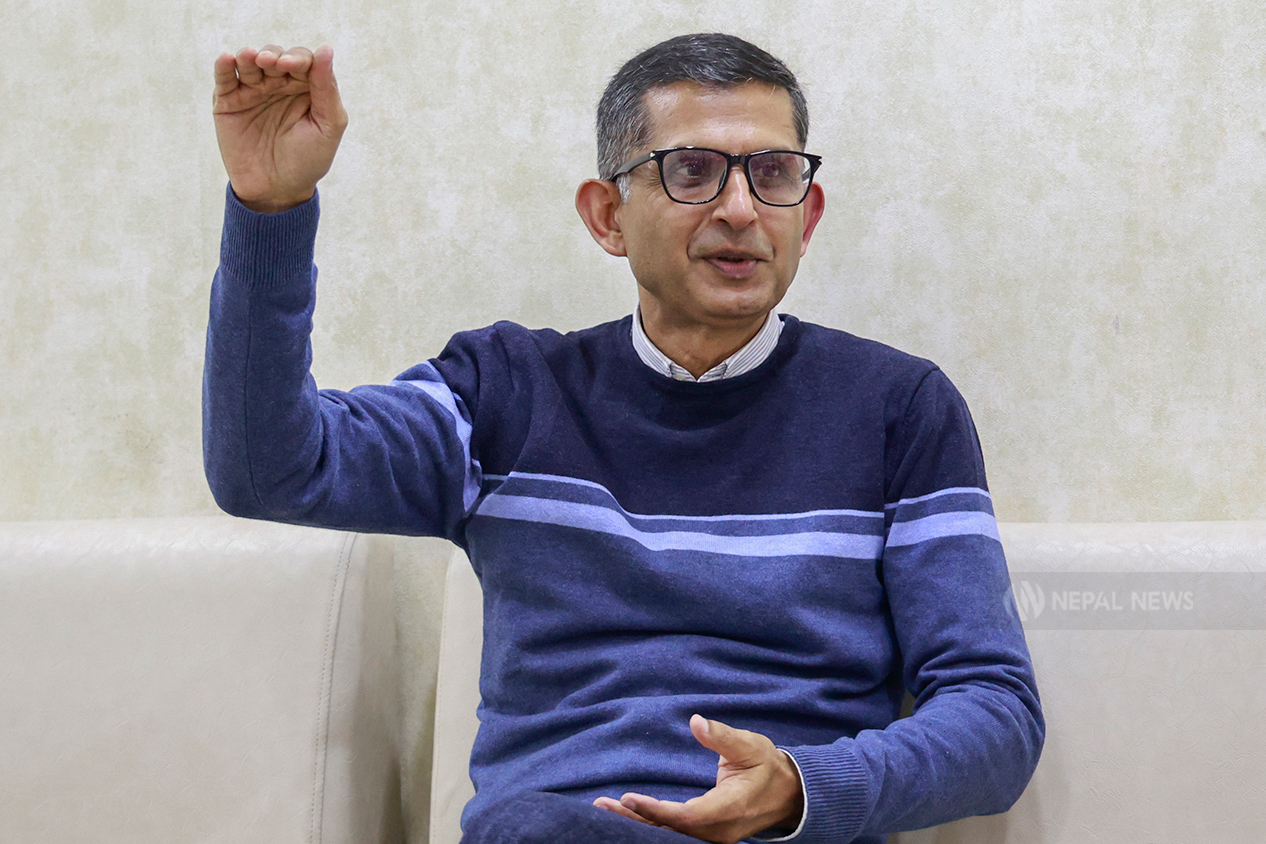
Hydropower is considered the basis of Nepal’s economic prosperity. How reliable is this basis?
Nepal has made a leap in the hydropower sector. Electricity is being exported to India and Bangladesh as well. However, we should not focus solely on hydropower with the mindset that it alone will make the country prosperous. There are a few reasons for this. Currently, more than three thousand megawatts of electricity are being generated during the rainy season. But domestic demand is only half of that.
The remaining electricity has to be sold to neighboring countries. Due to the geographical condition, it is not easy to sell electricity to China. Even if we sell to Bangladesh, Pakistan, and Sri Lanka, we have to use India’s route. Moving forward, instead of selling electricity abroad, emphasis should be placed on establishing electricity-based industries within the country. If hydropower is considered an area of comparative advantage, then we must be able to establish industries that use it and be competitive.
When talking about hydropower, Nepal’s geographical location should not be forgotten. The effects of natural disasters are increasing due to climate change. The risk of glacial lake outburst floods, landslides, and earthquakes is also increasing. Hydropower projects are built in the upper mountainous regions. The damage caused by the great risk of natural disasters can itself create problems. Therefore, I feel it is already late to consider hydropower as the main basis of Nepal’s prosperity.
If there is a risk in hydropower, and there is an inability to compete with neighboring countries China and India in agriculture and industry, then what is the sector that can support Nepal’s economic prosperity?
Agriculture has become an extremely complex issue for Nepal. It has been 50/60 years since people started saying that industrialization and commercialization of agriculture must happen, but we have reached nowhere. Looking at all of Nepal’s policies, programs, and plans, there is talk of commercial and industrial agriculture. Problems are now beginning to appear in that. The effect of climate change is also present here.
Currently, many campaigns are being started around the world to return to organic and traditional agriculture. The size of land ownership in Nepal is also extremely small. Although the issue of food sovereignty is included in the Constitution of Nepal, many people do not even know why it was included.
The social campaign for food sovereignty opposes commercial and industrial agriculture. Its emphasis is on promoting organic farming based on small-scale farmers. A campaign to move away from chemical fertilizer-based agriculture is also ongoing in Nepal. Therefore, I do not think we can advance the journey to prosperity by relying on agriculture.
There is also the argument that agriculture creates significant employment. This is exactly the opposite. Because if agriculture is to be made competitive, many people must be removed from agriculture and modern technology-equipped machines must be used. How can employment be created when there is a situation where existing people need to be removed? Along with primary agriculture, there is also talk of agro-based industries. I do not think we can move towards that immediately. If no major achievement has been made in so many years of effort, I do not see potential in this area.
Various forest-based industries can be run. There is great potential for plywood export from Nepal to India. We have not been able to identify what other such areas might be. It has been many years since people started saying that the forest area should not be touched in the name of conservation in Nepal. The concept should be to work on taking conservation and development forward together. If we look at India and China and try to emulate their large industries, we will go down the wrong path.
I see great potential for Nepal’s prosperity in the service sector, especially tourism and information technology. The government must also focus on this and work. Prioritizing information technology does not mean abandoning other sectors. Currently, the younger generation is developing good capacity in information technology. They are creating opportunities. It is also possible to be competitive in information technology compared to other sectors.
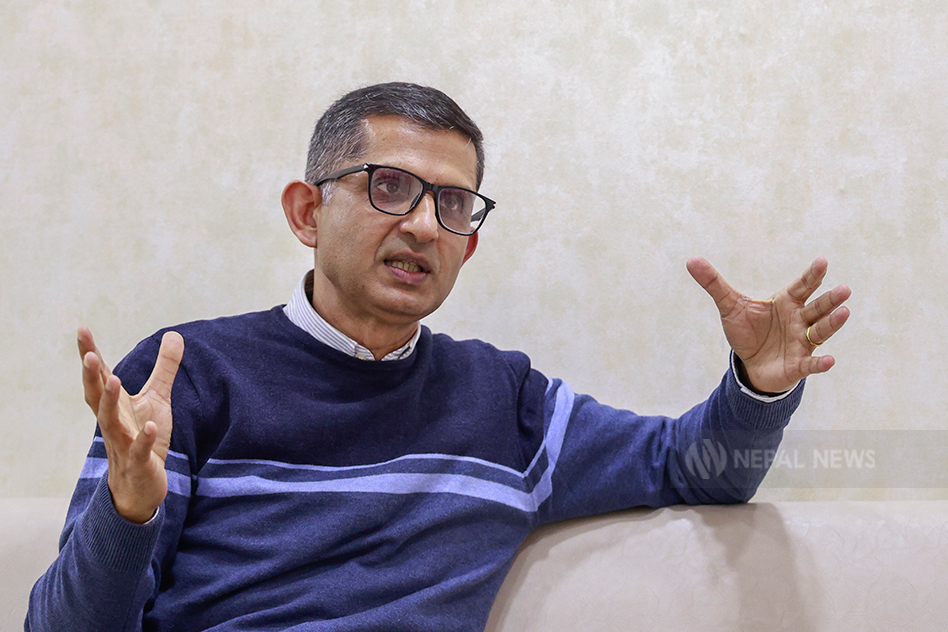
Around two thousand young people emigrate daily for employment. How can the situation where youth go abroad due to lack of job opportunities at home, and the country relies on remittances, be improved?
There is widespread commentary that a large number of youth are going abroad. Some people are even criticizing the government, saying its job has become to export youth. This is a time of demographic dividend. Such a workforce should be utilized in national development. However, people are attracted to where they see opportunities. If there were no job opportunities in the Gulf countries, how dire would the current situation be? We should also think about that.
It is not possible to create employment opportunities for everyone in the country itself. It is not that past governments did everything badly, nor is it that they did only good things. But in Nepal, there is a situation where work has to be done amidst many obstacles. There is a need to maintain competition and balance with two large countries. It is not that there have been no improvements or no opportunities created in Nepal.
Our aspirations have also increased. Seeing global progress and practices, people feel that the change and development that has occurred in Nepal are insufficient, which is certainly true. But no matter which government comes to power, it is not possible to immediately increase the kind of employment everyone seeks in Nepal.
On the other hand, a narrative has been created that everyone who goes abroad for employment goes out of compulsion. That is not the complete reality. The private sector complains that if you look for a skilled person in Nepal, you cannot find them immediately.
As soon as a skilled person gets a better facility, they go abroad. Nowadays, people plan to go abroad even before completing grade 12. Not everyone goes abroad because there are no good study opportunities in Nepal. Nepalis go abroad not only out of compulsion but also with the thought that they will find better opportunities than in Nepal.
The national census data shows that about two million Nepalis are abroad. However, some say that 4-5 million people are abroad. In a country with a population of 30 million, two million people being abroad is not a big deal. Moreover, people keep coming and going. There was talk of bringing back youth by pasting pamphlets in various places abroad. But in this day and age, not all youth will stay in the country; that will not happen.
Nepal’s trade is mainly dependent on India, and there are also issues between the two countries regarding trade. How can Nepal-India trade be further strengthened?
Almost all goods exported from Nepal to India are supposed to go tariff-free. However, non-tariff barriers under various names are the main problem in Nepal-India trade. For example, the export of agricultural materials from Nepal to India is repeatedly obstructed. There is a provision that some industrial goods can only be exported after certification by the Bureau of Indian Standards. However, recently, some exports from Nepal to India were stopped for a long time as that process was not completed.
For example, the export of plywood and shoes was obstructed for a long time. Many such issues in bilateral trade between the two countries have been identified a long time ago and discussed many times. Their long-term solution is essential.
Mainly, if there was a system where the quality certificates issued by Nepal and India were mutually accepted, the obstruction to exports would be largely resolved. Some work had also started on this. It must be advanced on a priority basis. The government should provide all possible support for the production and trade of goods that are competitive and have the potential to create employment.
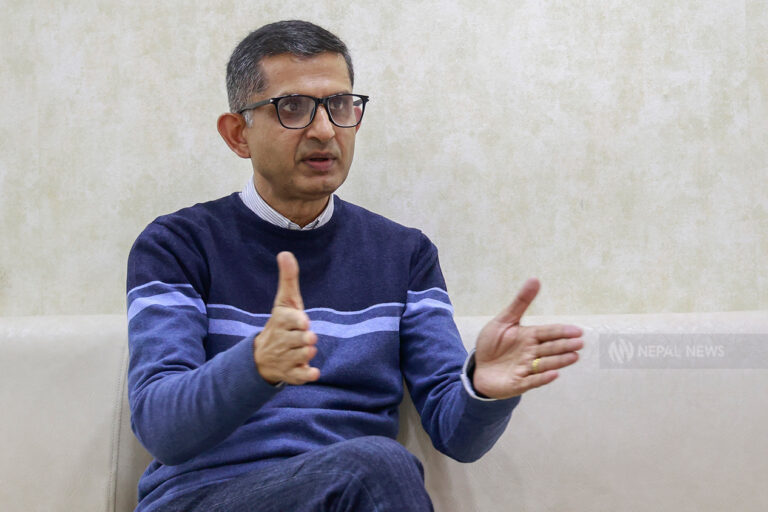
Nepal is in the process of graduating from a Least Developed Country to a developing country. However, the private sector is in favor of postponing this graduation for some time. What are the advantages and disadvantages for Nepal from this?
Nepal is on track to graduate from Least Developed Country (LDC) status in November 2026. Nepal is graduating from LDC status after receiving a five-year transitional period. Other countries only received a three-year transitional period. Due to the COVID-19 pandemic, Nepal, Bangladesh, and Laos were given more time.
Nepal met two of the three criteria: Human Development Index, Economic Vulnerability Index, and Gross National Income. Nepal lagged behind in the national income criterion. Among the countries that have graduated so far, Nepal is the only one set to graduate without meeting the national income criterion.
Nepal was already eligible for LDC graduation in the 2015 and 2018 reviews. There is a provision for LDC graduation once a country is deemed eligible twice. However, Nepal requested a deferment, citing problems due to the 2015 earthquake.
Looking at the Human Development and Economic Vulnerability aspects, there must have been some improvement in Nepal, which is why we reached the point of graduation. This shows that achievements are being made even while a narrative of ‘nothing has happened in the country’ is being formed. Graduating is also a happy thing. It increases the confidence of Nepalis. It also sends a message to the world community that Nepal is not a poor, least-developed country. I think this will elevate the identity of Nepal and Nepalis.
However, some facilities that Nepal receives as an LDC will be lost. Specifically, such facilities will be lost in trade. Concessions like low tariffs on exports and subsidies in value addition standards will be lost. But two-thirds of Nepal’s trade is with India. The bilateral trade treaty between Nepal and India is unconcerned with whether Nepal is an LDC or a developing country. Therefore, Nepal’s graduation from LDC status will not make any difference to trade with India.
The main area where Nepal will be affected is the European market, where Nepal’s exports are very low. It seems that less than five percent of total exports will be affected by Nepal’s graduation from LDC status. Thus, no major impact is expected on exports. Moreover, even after Nepal graduates from LDC status, the European Union provides a further three years of transitional facility. That is, Nepal can export under the same facilities it is currently receiving until November 2029.
I have heard that there are discussions about requesting the United Nations again for a deferment, citing the difficulty of sustaining the graduation now. But we were given five years for preparation. If we cannot become ready and competitive even with this much time and with the European market, which is the main place of impact, giving an additional three years, when will we become capable?
The question arises as to how long we will remain an LDC. Currently, we have even crossed the per capita income threshold. We should not show helplessness now by saying that we are not capable. We should move towards graduating from LDC status.
Instead, we have suffered great damage from the impact of climate change. We are not the cause of this. We should be lobbying the international community for compensation for that damage. Even after graduating from LDC status, we should draw the attention of the international community to the need to increase ‘climate finance’ for Nepal.

For a country to become rich and gain momentum in development, the civil service, which is considered the permanent government, needs to work with the highest sense of responsibility. What steps should be taken to make the civil administration efficient for quick results?
In one word: Technology. Comparing the past and present situation, there have been significant improvements in many areas. Whether it is making citizenship certificates, passports, or working at the ward office, the service delivery seems to have improved significantly. Electricity bills can be paid from home. The system for paying fines for traffic violations has started through the Nagarik App. Such improvements have occurred in many places. This is the change that happened with the help of technology. But this is not enough.
The current younger generation is extremely anxious and needs fast work. The youth have seen fast service elsewhere, and it is also possible. On the other hand, work is being affected due to legal complexities. There is also a tendency not to work at all for fear of getting into trouble even when taking responsibility and working. If legal hurdles are removed to make work easier, and if zero tolerance for good governance and corruption is maintained, it will not take long for improvements to be achieved.
Rameshore Khanal, a former administrator who understands the economy well, is the Finance Minister. What issues should he focus on in the coming days?
He is a capable individual. I had the opportunity to work with him for a short time. He is focused on the subject matter and competent in every way. He has been demonstrating his capability since he took charge of the Ministry. His efforts to streamline the budget by cutting fragmented projects, reducing expenditure, and withdrawing unrecognized services are commendable. They are in an interim government. The kind of improvements that happen depends on how long this government lasts and how much work it can do. The current government is unlikely to prepare the budget. It will only implement the budget prepared by others.
He is also a person who works closely with the private sector, understanding their concerns. He knows well what facilities need to be provided to the private sector. He has the experience of working as the coordinator of the High-Level Suggestion Commission for economic reform, from preparing the Nepal Trade Integration Strategy (NTIS), and he has the documents he himself prepared. His start looks promising. He has already identified the problems, and he also knows the solutions. If he advances those very things, it will set an example for the future.